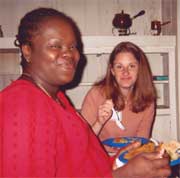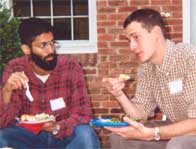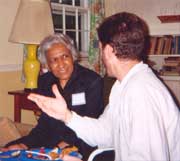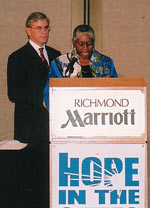 All material ©2006 Initiatives
of Change
All material ©2006 Initiatives
of Change
Open Homes, Listening Hearts 2004
So what does an Open Home look like?
In Phoenix, AZ, at the home of William and Lee Storey, about fifteen people gathered for dinner and a conversation. The guests responded to the question, “What about your race or faith do you feel is misunderstood by others?”
A Muslim woman shared her experience of dealing with a hostile publicity in the media. She said that her response to negative people is to invite them to have lunch with her. “It’s hard to hate somebody you know.” A World War II veteran said he felt his generation shouldn’t been seen as extraordinary. He wanted younger generations to believe that they can accomplish great things, too.
An African-American woman told how her co-workers expected her to not have good ideas and even ignored her comments. An African-American university student related how classmates were surprised when she did good work because they expected her to be lazy. A Christian man spoke of how people of faith are often viewed as narrow-minded or intolerant of others.
After over an hour of interaction, the group expressed appreciation for the honesty and openness of the conversation. A number said they had learned new things about others. Mr. Storey said the beauty of the concept was how simple it was and how the questions got people talking. Mrs. Storey later said, “It was a unique opportunity to speak freely, find commonality and express differences without being combative in these otherwise difficult times. The evening provided a new understanding and appreciation of each others' hopes, fears, cultures and faiths in a heartfelt spirit of love for one another.”
In Washington, DC, almost fifty people came to the home of Dick and Randy Ruffin. Many guests brought meals from their respective countries. Animated discussions about cultural misunderstandings—-as well as favorite holidays and the meanings of names—-filled the summer night. One guest shared how the celebration of Ramadan gave her a special connection with her grandmother. A man from Nigeria shared how he first celebrated American Thanksgiving as a guest of an American family when he was a student. Now Thanksgiving represents a special time to welcome all kinds of people to his home.
“Hearing others’ answers made me really think about my own background and culture,” one guest reflected afterwards. “I discovered aspects of other cultures that I want to adapt into my own.”
A similar event in Minneapolis, MN, drew 27 guests to the home of Mike and Helen Olson. Among the guests were a local politician, a leader of an Islamic center, and a professional singer. A few individuals had been asked beforehand to lead small group discussions about when people felt excluded as well as aspects of themselves or their cultures they wanted others to understand. This produced a time of heartfelt sharing. A number of the guests decided to continue meeting in the future to build on these initial conversations.
Lee Storey expressed the feelings of many of those who took part in the 2004 celebrations: “If only all people everywhere created an evening of opportunity to express love for humanity through Open Homes, Listening Hearts.” Then, perhaps, strangers on the street would start looking like old friends.
To promote Open Homes for 2004, Initiatives of Change-USA partnered with organizations such as the National Coalition for Dialogue and Deliberation, the Public Conversations Project, Boston Mobilization, the Interfaith Conference of Washington, DC, the National Multicultural Institute, and the Commission of the Religious Leaders of New York City.
Open Homes, Listening Hearts 2003
Around the world on June
1, people celebrated the second annual day of Open Homes, Listening Hearts.
On this day, people reached out to others with whom they normally do not
interact—of different races, ethnicities, or religions—and welcomed them
into their homes for meals and personal storytelling.
In Washington, DC, about forty guests came to the home
of Dick and Randy Ruffin. The
evening began with stories from some of the Caux Scholar Alumni. Zack
Rothschild explained the origins and meaning of his four names; Ranya
Kargbo told about wedding traditions in Sierra Leone and Debu Gandhi shared
how he often did not fit people’s stereotypes of someone from India. The
guests gathered in small groups and shared similar stories, and then everyone
joined in a multicultural potluck dinner. In California, Hasani Perry
hosted an event at a senior center where she is an educator. In Tennessee,
a birthday was celebrated with guests of different races. In Florida,
Rev. Crystal Bujol and her guests shared stories about racial segregation,
life in Russia, and returning to the US after Vietnam. Elsewhere in the
world, women from three different religious backgrounds and three ethnic
communities of Fiji gathered in one home. Each told stories about “landmarks
that have shaped my life.” In Australia, people shared over tea in small
groups as well as some larger parties of 30 and 50 people. The reports
are still coming in as we go to press.
The day was established by Initiatives of Change, and other civic and religious organizations helped to promote it. Yehezkel Landau, faculty associate in Interfaith Relations at Hartford Seminary and cofounder of the Open House Center for Jewish-Arab Coexistence in Ramle, Israel, called it “a laudable initiative that allows people from all walks of life to contribute to peacebuilding and mutual understanding in our troubled world.”
From Breakthroughs
(top)
What happens when we reach out to people who are different from us? Here is the story of two American couples (left to right in photo): Malik and his wife Annette are Muslims; Virginia and her husband Ben are Christians.

Virginia: What happened on
9/11 made me see that we needed to know people whose faith is Islam. I
immediately put in an application to join the Interfaith Council. Neither
my husband nor I knew any Muslims personally, though we have met some
and heard Muslim speakers, but we certainly did not know any from the
Richmond area. I sat at the first event, a dinner, and prayed, “Lord,
if you want us to get to know some Muslims, please arrange for us to have
dinner with some.” And in walked Malik and Annette.
Malik: Annette was in line to register for the dinner when Virginia
who was standing nearby asked if she (Annette) was Muslim and if she could
sit with us for dinner. Annette had a head covering which she uses for
her hijab, which could have indicated she was a Muslim.
Virginia: We had a good conversation and during the meal I showed
them a pamphlet entitled “Bridgebuilding between Christian and Muslim”
by Harry Almond and Dr. Jamal Badawi. It turns out that Dr. Badawi was
one of their good friends! From then on we kept talking and our hearts
were open to each other.
Malik: We exchanged some ideas
about the heinous crime that was committed on September 11, 2001. Both
Annette and I tried to provide perspective from an American Muslim’s
point of view. We also tried to explain that Islam does not permit such
atrocities against innocent people.
Virginia: It took some courage for me to act on my thought and
go meet new people. In my talks with Muslims, I realize they too feel
the need to reach out and come out of their seclusion. It has been a superb
learning experience for us. We have made new friends. That is the jewel
in itself.
Malik: The sincerity and the desire to bridge different cultures
exhibited by Virginia and Ben give us a tremendous lift and hope.
From Breakthroughs
(top)
Ordinary acts of hospitality—like inviting a person of a different race or religion into your home--can have unexpected results. In 1980 Rob and Susan Corcoran, who are Caucasian, arrived in Richmond, Virginia, with an eleven month-old son. Rob recalls,
“The very day that we moved into our home in a racially mixed neighborhood, the doorbell rang and there was an African American woman standing on the front step. She said, “My name is Audrey Burton and I have come to welcome you to the neighborhood.” We talked. Audrey asked about my wife. I said she was upstairs bathing the baby. Without a moment’s hesitation Audrey swept by me and went upstairs. It never occurred to Audrey to do anything else. It was the start of a great friendship that has led to a wave of unexpected partnership building across the city. We’re still neighbors.”
That “partnership building” eventually created the organization “Hope in the Cities,” which brings different sectors of a community together for honest conversations on race, responsibility and reconciliation. In 1998, Hope in the Cities assisted the White House Initiative on Race in developing a public dialogue guide for use across the US.
All this resulted from simple acts
of reaching out to
different kinds of people. Such actions are not always
easy. In the book, All
Her Paths Are Peace by Michael Henderson, Audrey says, “There
was a buildup of pain, anxiety and frustration caused by racism and by
the way I had been socialized and shaped by society. There was a need
in myself to release a drowning spirit, to open up a well, so that I might
go to the real spirit the Creator has for me.”
Audrey and her husband, Collie, are risk-takers who had the courage to begin the change process in their own lives and have taken extraordinary initiatives to bring people together. They continue to use their home as a place for hospitality and to connect with the people around them.
|




